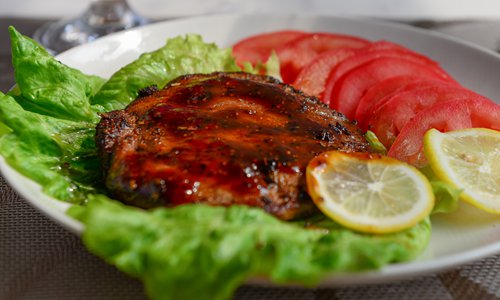HOME >> SOURCE
Australian beef ‘rip-off’ should lead to blacklist: experts
By Huang Ge Source:Global Times Published: 2020/1/7 21:08:40
China still moving to diversify meat import sources

Black Garlic laced Australian Beef Sirloin Steak, served with Potato and Truffle Slices Photo: IC
Australian beef exporters whose price volatility may disturb the Chinese market should be put on a blacklist, experts said on Tuesday. Given the background of pork price rises in China, foreign meat producers are expected to charge reasonable prices to Chinese buyers instead of driving deals at exorbitant prices, the experts said.The price of Australian beef exported to China has gone through a "roller coaster" ride, as 85CL beef products rose from $2.54 per pound in October to $3.1 per pound in December and then fell again to $2.33 per pound, acbnews.com.au said in a recent report
In December alone, the price decreased around 20-25 percent, the report said.
A Shanghai-based beef importer who asked to remain anonymous told the Global Times on Tuesday that "there has been great price fluctuation for beef imports during recent months and the retail prices of the products in my store have been adjusted accordingly."
Some Australian exporters signed agreements for beef exports with Chinese buyers during the price peak period in China, when the outbreak of African swine fever sent domestic pork prices soaring.
As certain beef prices fell by more than 30 percent, some Chinese importers chose to cancel their contracts and forfeit the 30 percent cash deposits they prepaid when making the contracts, the acbnews.com.au report said.
If foreign meat producers continue to raise deal prices given rising pork prices in China, they will lose Chinese consumers and even the market, said Li Guoxiang, a research fellow at the Rural Development Institute of the Chinese Academy of Social Sciences.
Li told the Global Times on Tuesday that such "rip-offs" would lead to boycotts by domestic consumers and distributors.
The Chinese government is expected to strengthen regulations on domestic and foreign transactions in the Chinese market, Li said.
"Foreign exporters' beef price hikes that disturb the Chinese market should be put on a blacklist in the future," he said.
The Chinese government should increase domestic production to meet market demand, instead of being restricted by foreign exporters, and China is expected to diversify import sources, Ma Wenfeng, a senior analyst at the Beijing Orient Agribusiness Consultancy, told the Global Times on Tuesday.
China began to import meat from 16 more countries in 2019 to increase pork imports and diversify import sources, the General Administration of Customs said on December 30, 2019.
China is the largest pork consumer in the world and the domestic pork supply gap also provides a broad market for major meat exporters. During the second China International Import Expo last November, industry leaders called for global meat producers to have a long-term vision and charge reasonable prices, experts said.
The Chinese government has stepped up efforts to secure domestic meat supply and stabilize meat prices since mid-December, and the country has released more frozen pork from reserves ahead of the holidays. So far, China has put more than 100,000 tons of pork from reserves into the market, according to Chinese financial website jin10.com.
Posted in: INDUSTRIES,MARKETS